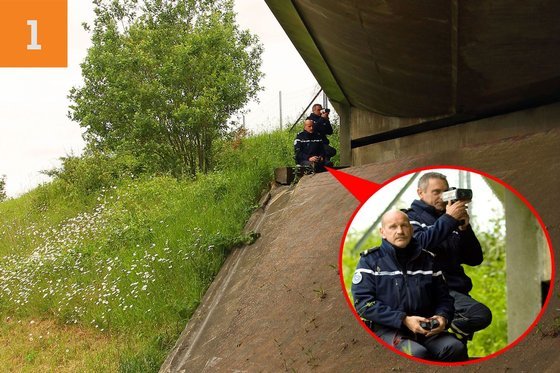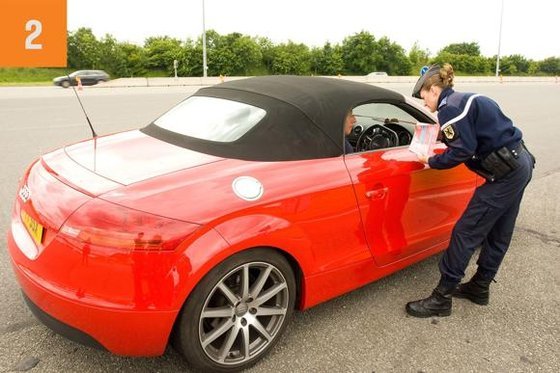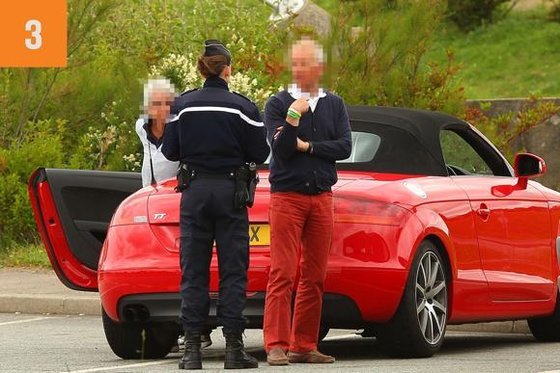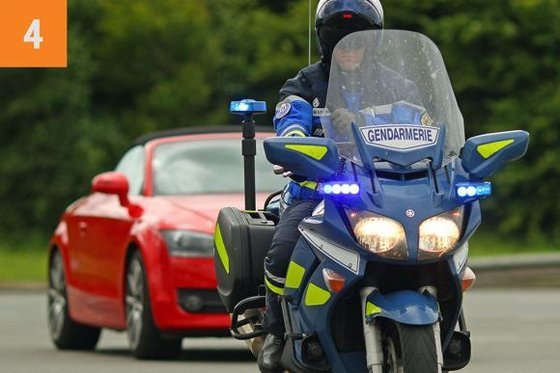Of course we normally want to put a positive spin on buying, moving and living in France but it is important to keep clients up to date with French news and issues, so here goes another story about the woes of speeding when driving in France.
We send hundreds of people on viewing trips each month so it only seems right to publish this article about speeding in France and the consequences of it, the article appeared in The Times newspaper on the 22nd June 2014, so hopefully our clients can take note and get to the property viewings safe and sound and with enough money left to be able to buy a house in France!
Drive safely within the limits and everything swill be fine, but break the speed limits and........
British holidaymakers in France face draconian penalties this summer as a hidden force of gendarmes cracks down on speeding, reports Dominic Tobin
IT'S 4.03PM on the A16 autoroute, which runs between the outskirts of Paris and Dunkirk, via Calais. Standing next to a British-registered Audi TT is a man with shoulders hunched like a schoolboy, receiving a dressing-down from a French traffic officer.

Hiding under a bridge on the A16 last week, Gérard Andrieux, left, and Yves Renard of the French police catch a British driver speeding in his Audi TT.
He is being asked to hand over his driving licence — which he does. It will be posted back to him, but not for weeks, and in the meantime he is told he is banned from getting back behind the wheel in France for three days. As he makes his apologies, his wife is sent to a nearby cash machine — accompanied by a policeman — to get the money to pay a 135 euros (£108) on-the-spot fine.
Welcome to speedy justice, French style. The driver has been clocked with a laser gun by a crack team of gendarmes out to catch British drivers who forget that France is not a playground. At 179kph (111mph), on an autoroute with a 130kph (81mph) limit he was lucky not to have his car seized, the authorities say. They are gearing up for a bumper summer as the annual exodus of holidaymakers begins and drivers head for holiday homes and campsites on the south and west coast of France.
This strict enforcement of speed limits is all about safety, of course, but it also yields big dividends. Unlike their British counterparts, the police in northern France use on-the-spot fines as their main weapon. Armed with laser guns and concealed under motorway bridges and in roadside hedges, they are catching more British drivers than any other west Europeans.
More than 1m British holidaymakers are expected to be driving into France this summer, mainly through Calais and down the A16, or the other major route south, the A26, and French police predict they will collect a total of 1.73bn euros (£1.38bn) in speeding fines in 2014, up from 1.66bn euros last year.

The first the driver knows of it is when he is pulled over at the next toll booth.
In Britain, police generally give motorists some leeway above the speed limit before they are stopped. The pelotons motorisés — the name for the traffic gendarme units — stop drivers even if they edge above the speed limit by 1kph. Neither are drivers given the courtesy of being warned that they are entering a zone where speed traps are in operation on the routes that radiate from the ferry ports and Euro-tunnel. The pelotons motorisés have taken to examining the manifests of trains and ferries, checking for high-powered sports cars that they suspect might be more prone to speeding, and deploying squads of officers to target them.
Once a car has been clocked above the speed limit there is no requirement for photographic evidence; if the policeman says the car was speeding, it is up to the driver to prove he was not. Justice, when it comes is summary and swift: as well as on-the-spot fines, drivers can receive an instant ban.
While the gendarmes insist they have no special remit to catch British drivers, they point out the temptation for Brits to take advantage of the long, straight roads in France that are relatively uncongested. Added to that is the surge in popularity of organised rallies whose participants can sometimes forget that strict limits apply, even though organisers don’t condone law-breaking.
Known as rallyes sauvages (or wild rallies) in France, these events typically follow public roads towards the sun and sea in southern Europe. They attract wealthy, speed-loving owners of rare supercars. In 2006, police seized a Ferrari 360 and Porsche 911 for the offence of reckless driving. The two drivers, both British, were travelling at more than 150mph during that year’s Cannonball Run. At a subsequent court hearing, the cars were permanently confiscated and auctioned off. The Ferrari owner bought back his car for €88,000 (then £60,000).

He is asked to surrender his driving licence and is told he is banned from driving for three days.
Sharing intelligence with Kent Police, the gendarmes now scour lists of cars booked onto Channel Tunnel trains or ferries, on the lookout for a telltale cavalcade of fast cars. “They know we react quickly and so they have started trying to cross during the evenings, at night, or around midday [when many French police officers go home for lunch],” says Captain Jean-Claude Derudder, second in command of the road safety department in the Pas de Calais region. “That doesn’t stop us from setting up speed checks quickly.”
Buying tickets for the Channel crossing at the last minute won’t help. “We only need 20 minutes to set up a speed check,” says Derudder. As it takes at least 30 minutes to cross the Channel, we have plenty of time.”
Officers have the power to seize cars for speeding alone. A staggered series of penalties was introduced in 2006, beginning with on-the-spot fines and moving on to an instant driving ban if drivers were caught at more than 40kph over the speed limit. Motorists speeding by more than 50kph over the limit could have their cars seized. It was a fate suffered by a Ferrari F355 owner last Sunday evening. Caught travelling at 191kph (119mph), the driver from London was forced to make his own way home after paying a €750 court deposit.
It is not just supercar owners who are being caught in the clampdown. Ordinary British holidaymakers are easy prey for the gendarmes.
Last Monday,we crossed the Channel to witness the French tactics as officers prepared for the summer by setting a trap for British spectators returning from the weekend’s Le Mans 24-hour race in the Sarthe deparmtent.

His wife then gets behind the wheel and is escorted to a cash machine in order to be able to pay a €135 deposit, pending a court hearing in November.
Yves Renard (his surname means “fox”) and his colleague Gerard Andrieux head to a discreet spot underneath a bridge, five miles from the autoroute’s final toll booth before Calais. Renard points the radar gun at oncoming traffic and reads out the speed of any car breaking the 130kph limit. Andrieux picks up his mobile phone and passes the details to his colleagues lying in wait at the toll booth. The first time most drivers know they are in trouble is when the toll barrier lifts and they are directed to pull over in the lay-by.
“In the past, people just raced through France at 200kph with wads of cash in their pocket, paid the fines at the roadside and then carried on,” says traffic officer François Maquinghen. “But that has stopped since the rules changed because they know that they will lose their car.”
“If you are going at 131kph you could be stopped,” says Maquinghen. “We are tougher at some points on some routes where there have been a lot of accidents. At others, you might not get stopped unless you are going faster than 150kph.”
It isn’t long before a British driver is caught. Joe Adams, 24, an engineer from Dartford, Kent, is caught travelling at 150kph in his Lexus GS and is handed a €45 fine. “I don’t recall speeding and I didn’t see the speed gun,” he says. “They’re not as visible as in Britain.”
Without enough cash to pay the fine — police accept only euros or French cheques — Adams has to hand his passport to the gendarme and drive to the nearest cash machine, then return to pay the fine.
Matthew Yates, clocked at a similar speed in his Maserati GranSport, accuses the police of using speed traps as revenue-raisers. “Doing 151kph on a wide, clear 130kph road is nothing,” says the 43-year-old from Chichester, who organises events for fellow Maserati owners. “And the 45 euros fine isn’t too bad.
“But they don’t seem to stop the French. There were French cars overtaking me but I’m the one who’s been stopped. We know it’s only for the money and I’ve come to expect it.”
In three hours at the roadside we notice only one French car being stopped and six British, but the police insist that they take no notice of where a car is registered. They just want to stop drivers who are travelling at dangerous speeds.
That said, the gendarmes think that dealing with British drivers is a pleasure. “They are very polite, they don’t argue and they always pay,” says Mégane Painset, a three-year veteran of the highway patrol. “Usually the excuse is that they were late for their ferry. But they still have to pay.”
There’s only one problem in the gendarmes’ eyes, though: they are still unable to access drivers’ details from a registration plate alone. Which means the hundreds of speed cameras across the motorway network are virtually useless in catching speeding British drivers. That is about to change. As revealed last month in Driving, a new law being drawn up by the European Commission will allow French police to track down British drivers from next May. And then there really will be no escape for British speeders.
Stiff penalties
French penalties depend on the speed drivers were travelling when they exceeded the limit. In urban areas, fines are set at 90 euros for 1-39kph above the 50kph limit. On faster roads, including autoroutes, these apply:
1-19kph (up to 12mph) over limit
45 euros (£36) on-the-spot fine.
20-39kph (12-24mph) over limit
90 euros (£72) on-the-spot fine.
40-49kph (25-30mph) over limit
135 euros (£108) court deposit and instant three-day driving ban in France only. This is followed by a court case, often several months later, when the ban could be extended for up to three years (two or three months is typical). The court retains the deposit as a fine unless the driver successfully argues it was wrongly imposed.
More than 50kph over limit (31mph-plus)
750 euros (£600) court deposit and car impounded. This is followed by a court case. If the motorist is deemed to have been driving dangerously, their car can be permanently confiscated. The court can retain the deposit and increase the fine to 1,500, or 3,000 euros for repeat offenders.
This article originally appeared in The Sunday Times on Sunday 23rd June 2014.
Blog submitted by: David at The French Property Network - Cle France.